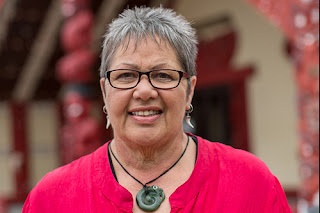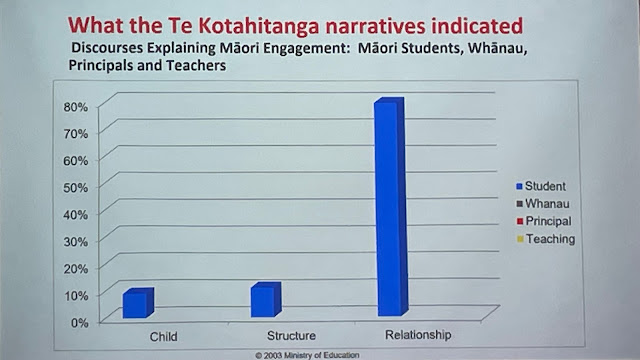SPANZ Day 4 - Keynote - Dr Mere Berryman - Indigenising and Decolonising: Structural and Cultural shifts
 |
| De Mere Berryman |
From the SPANZ programme:
Understanding contexts for learning where equity and belonging can be a reality for Māori means coming to deeply understand historical events that have seen the systematic belittlement and redefinition of Māori identities through colonisation. Upon this historical legacy of cultural harm, school policies were imposed this century, so that we would step up (Ka Hikitia) and establish educational structures where Māori learners could ‘enjoy and achieve education success as Māori’. Today contexts for learning have seen mātauranga Māori being appropriated and applied across the system. Courageous leaders, who commit to making the aspirations of Ka Hikitia a lived reality in their schools, are ensuring that this generation of Māori learners is better served by education. Importantly they have also shown the benefits that ensue for Māori can be for all.
Article from RNZ: https://www.rnz.co.nz/national/programmes/the-weekend/audio/2018677651/mere-berryman-it-s-time-we-did-better-by-maori-students
Link to Poutama Pounamu: https://poutamapounamu.org.nz/
The risk of "indigenising" and "decolonisation" becoming a rhetoric.
Te Kotahitanga Research 2001
Our children are quite aboriginal in their behaviours outside school. The fact they're the same school n many days. You know... (p.216)
What the Te Kotahitanga narratives indicated.
Te Kotahitanga Effective Teaching Profile
The Effective Teaching Profile consists of six elements.
- Manaakitanga – teachers care for their students as culturally located human beings above all else.
- Mana motuhake – teachers care for the performance of their students.
- Nga whakapiringatanga – teachers are able to create a secure, well-managed learning environment.
- Wananga – teachers are able to engage in effective teaching interactions with Māori students as Māori.
- Ako – teachers can use strategies that promote effective teaching interactions and relationships with their learners.
- Kotahitanga – teachers promote, monitor and reflect on outcomes that in turn lead to improvements in educational achievement for Māori students.
The Effective Teaching Profile was implemented in the classroom of participating teachers in 2004 and 2005 by means of the Te Kotahitanga Professional Development Programme. This programme consists of an initial induction hui, which is followed by a term-by-term cycle of formal observations, follow-up feedback, group co-construction meetings, and targeted shadow-coaching. Other activities that support this programme, such as new knowledge, new teaching strategies and/or new assessment procedures are introduced on a “needs” basis.
From: https://tekotahitanga.tki.org.nz/About/The-Development-of-Te-Kotahitanga/Effective-Teaching-Profile
Education matters to me: Key Insights Report: https://www.childrenandyoungpeople.org.nz/publications/reports/education-matters-to-me-key-insights/
Introduction of NELP in 2018 "in the schooling and education, and beyond, we have an issue of unconscious bias..."
"Māori student and under-achievement is chronic, intractable and systemic" (Holsted, 2018)
To understand how to respond to our challenges in education, we need to understand the historical biases and prejudices that are deeply embedded in our racialised colonial systems. - Moana Jackson.
The Doctrine of Discovery
Learning about the 'Doctrine of Discovery 1452'
 |
| Source: Dr Mere Berryman |
The Doctrine of Discovery (also known as the Doctrine of Christian Discovery) is an international legal concept and Christian principle, that is borne out a number of catholic laws (called “papal bulls”) originating out of the Vatican in the 15th and 16th centuries. It gave the monarchies of Britain and Europe the right to conquer and claim lands, and to convert or kill the native inhabitants of those lands.
Source: https://tinangata.com/2019/06/01/james-cook-and-the-doctrine-of-discovery-5-things-to-know/
The hierarchy of races and Social Darwinism.
 |
| Source: Dr Mere Berryman |
 |
| Elizabeth Forgie - Keri Keri High School |
- Bilingual signage
- Translations rather than the metaphors
- Kapahaka
- Te re Māori
- Māori iconography
- Transactional
- Transformational
- Transformative
Critical consciousness - a level of sociopolitical awareness through a person understands their positionality in the world.





Comments
Post a Comment